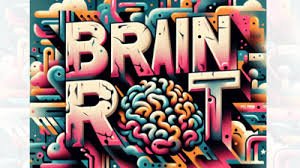Oxford Chooses “Brain Rot” as 2024’s Top Word
The Oxford English Dictionary (OED) has selected “brain rot” as its Word of the Year for 2024, reflecting a shift in societal concerns regarding cognitive health. The term “brain rot” typically refers to a condition where the brain deteriorates, often used metaphorically to describe mental fatigue or overexposure to harmful information. This word has gained prominence as discussions about mental health, information overload, and the effects of social media on cognitive well-being have escalated. The choice of this word highlights the growing concern around mental well-being in an increasingly connected world.
Impact of Mental Health Awareness in 2024
In 2024, mental health issues have taken center stage in global conversations. With the rise of digital technology, individuals are exposed to constant streams of information that can lead to stress, anxiety, and a decline in cognitive abilities. The concept of “brain rot” resonates with modern challenges, particularly among younger generations who are frequently engaged in online activities that can negatively impact mental clarity and focus. As a result, the need for addressing mental health and promoting healthy online habits has never been more critical. This focus on mental well-being has influenced discussions in both the healthcare and educational sectors, emphasizing the importance of protecting the mind in a rapidly evolving digital landscape.
Why “Brain Rot” Gained Popularity
The term “brain rot” has surged in popularity due to the increasing awareness of the impact of digital media on mental health. People have become more vocal about the negative effects of excessive screen time, social media consumption, and the inundation of information. Psychological studies have shown that constant exposure to these stimuli can lead to mental exhaustion, decision fatigue, and even long-term cognitive damage. “Brain rot” has thus become a popular metaphor for these modern-day challenges, encapsulating the feeling of mental depletion that many individuals experience today.

Why This News is Important
Significance for Mental Health Awareness
The selection of “brain rot” as the Word of the Year underscores the growing importance of mental health in modern society. It highlights the widespread recognition of the negative consequences that excessive digital consumption can have on cognitive function. For students preparing for exams or professionals in high-stress environments, the concept of brain rot is a reminder to prioritize mental health. This news reflects the ongoing societal shift toward a greater emphasis on psychological well-being and the need for individuals to be more mindful of their digital habits.
Relevance for Policy and Education
The rise in the use of the term “brain rot” also reflects an increased focus on mental health policies in schools, workplaces, and governments. The growing recognition of this issue could lead to changes in how educational institutions and organizations address cognitive health. Teachers, for example, may focus more on the mental well-being of students, encouraging better habits related to technology use and ensuring that individuals are supported in managing stress.
Historical Context
The concept of “brain rot” isn’t new, but it has gained significant attention in the past decade. Over the years, digital media and technology have transformed how individuals interact with the world, often leading to concerns over the effects of constant connectivity on cognitive function. Historically, similar concerns were raised about the impact of television and radio in the 20th century, but today’s worries are more centered around the internet and social media. Studies have revealed that excessive exposure to digital screens can lead to a reduction in brain activity, impairing memory, attention, and learning abilities. As mental health and its intersection with technology continue to be a topic of research, terms like “brain rot” reflect the modern understanding of the cognitive costs associated with digital overuse.
Key Takeaways from “Oxford Chooses Brain Rot as 2024’s Top Word”
| S.No. | Key Takeaway |
|---|---|
| 1 | “Brain rot” has been chosen as Oxford’s Word of the Year for 2024, reflecting increasing concerns about cognitive health. |
| 2 | The term is commonly used to describe mental fatigue, overexposure to harmful information, and the effects of social media on the brain. |
| 3 | The rise of digital technology has led to greater awareness of its detrimental effects on mental well-being, especially among younger generations. |
| 4 | Mental health and cognitive function are becoming major topics in policy discussions related to education and workplace environments. |
| 5 | The popularity of the term signifies a societal shift towards addressing mental health issues and promoting healthier digital habits. |
Important FAQs for Students from this News
1. What does the term “brain rot” mean?
- “Brain rot” is a term used to describe mental fatigue or cognitive decline, often associated with prolonged exposure to harmful or excessive information, particularly through digital media and social media consumption.
2. Why was “brain rot” chosen as Oxford’s Word of the Year for 2024?
- “Brain rot” was selected due to the growing societal concerns around mental health, information overload, and the negative impact of excessive screen time on cognitive abilities, especially in younger generations.
3. What are the implications of the rise in the use of the term “brain rot”?
- The rise of the term signifies an increased awareness of mental health issues, particularly related to technology use. It emphasizes the need for better management of digital consumption and the prioritization of cognitive health.
4. How does “brain rot” impact education and policy-making?
- The popularity of the term highlights the importance of addressing mental health in educational settings and workplaces. It could lead to more policies focusing on reducing digital exposure and promoting cognitive well-being.
5. What can individuals do to prevent “brain rot”?
- To prevent “brain rot,” individuals should limit excessive screen time, engage in mental health-promoting activities, take regular breaks, and prioritize offline interactions and cognitive exercises.
Some Important Current Affairs Links

















